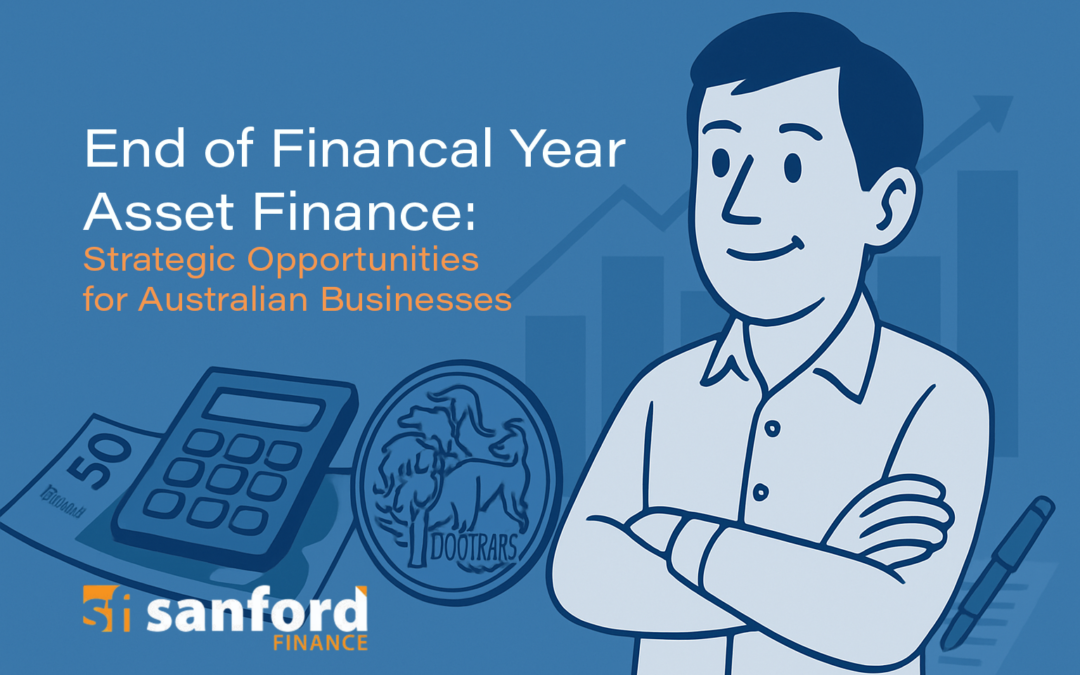
End of Financial Year Asset Finance: Strategic Opportunities for Australian Businesses
Apr 23, 2025 | Borrowing Power, Bridging Loan, Construction Loan, Debt Consolidation, Investment Property, Property Market, Purchasing, Refinance
EOFY Asset Finance: Strategic Opportunities for Australian Businesses
EOFY Asset Finance Countdown
Just 4 weeks until June 30
Time to act on your asset finance opportunities
Why EOFY Asset Finance Makes Strategic Sense
The end of financial year period offers several compelling advantages for businesses considering asset finance:
1. EOFY Vendor Discounts and Incentives
Many equipment suppliers, vehicle dealers, and technology providers offer their most aggressive pricing at EOFY. With sales targets to meet and new models often arriving after July, vendors frequently discount existing stock to clear inventory. These savings, often 10-15% off regular pricing, can significantly improve your return on investment.
2. EOFY Tax Benefits for Asset Purchases
Despite changes to asset write-off provisions in recent years, significant tax benefits remain available for business asset purchases before June 30:
Small Business Energy Incentive for EOFY Asset Finance
Businesses can claim an additional 20% tax deduction on eligible energy-efficient assets purchased and installed by June 30. This is on top of regular depreciation deductions, effectively providing a 120% deduction on qualifying purchases.
Eligible assets include electric vehicles, solar systems, energy-efficient HVAC equipment, and other assets that reduce energy consumption or emissions. Learn more about eligible assets on the ATO website.
EOFY Depreciation Benefits
While the temporary full expensing scheme has ended, standard depreciation rules allow small businesses (turnover under $10 million) to immediately write off assets costing less than $20,000. For larger businesses, assets can be allocated to a small business pool and depreciated at 15% in the first year and 30% in subsequent years. The business.gov.au portal provides comprehensive information on current deduction rules.
3. EOFY Interest Rate Considerations
With interest rates having stabilized after the recent hiking cycle, businesses now have more certainty around financing costs. According to the Reserve Bank of Australia, locking in current rates before any potential changes in the new financial year provides clarity for budgeting and cash flow planning.
EOFY Asset Finance Options for Business Equipment
Different financing structures offer varying benefits at EOFY. Here are the key options to consider:
EOFY Chattel Mortgage Financing
Best for: Businesses wanting to own the asset immediately and maximize tax benefits
Key advantages:
- GST can be claimed as an input tax credit in your next BAS
- Interest charges and depreciation are tax-deductible
- Flexible deposit options (including zero deposit structures)
- Potential to finance the full purchase price including GST
EOFY tip: A chattel mortgage settled before June 30 allows you to claim available tax deductions in this financial year, even if you only make one payment before June 30.
EOFY Finance Lease Solutions
Best for: Businesses prioritizing cash flow who don’t necessarily need to own the asset
Key advantages:
- Lease payments are fully tax-deductible as an operating expense
- Asset doesn’t appear on your balance sheet (off-balance sheet financing)
- Often includes flexible end-of-term options (return, refinance, or purchase)
- May have lower repayments than loan products
EOFY tip: Consider prepaying some lease payments before June 30 to increase your deductions in the current financial year. The Australian Finance Industry Association provides guides on different finance lease structures.
EOFY Commercial Hire Purchase Options
Best for: Businesses wanting ownership after a fixed term with structured payments
Key advantages:
- GST is spread across the term of the agreement (not payable upfront)
- Interest and depreciation are tax-deductible
- Fixed repayments for easy budgeting
- Balloon payment options to reduce monthly commitments
EOFY tip: A properly structured CHP can help manage cash flow while still securing EOFY benefits.
Your EOFY Asset Finance Checklist
To maximize your EOFY asset finance opportunities, follow this strategic checklist:
- Review your tax position: Consult with your accountant to understand your current tax situation and potential benefits from asset purchases
- Prioritize assets by need and benefit: Focus on equipment that will deliver operational improvements and qualify for additional tax incentives
- Research EOFY deals: Approach vendors early, as the best deals often sell quickly
- Compare EOFY financing options: Different structures offer varying advantages depending on your business circumstances
- Allow time for approvals: Lenders are typically busy during EOFY, so start the application process early
- Confirm delivery timeframes: For tax benefits this financial year, ensure assets can be delivered and installed before June 30
Industries Benefiting from EOFY Asset Finance Solutions
Construction & Trades EOFY Equipment Finance
With continued infrastructure development and residential construction activity, trades businesses are upgrading utes, trucks, and specialized equipment. The Small Business Energy Incentive is particularly valuable for those investing in newer, more efficient vehicles and machinery. Check out the Equipment Finance Hub for construction-specific financing options.
Healthcare EOFY Asset Financing
Medical equipment, specialized technology, and practice fit-outs can all be strategically financed before EOFY. Many healthcare providers are updating diagnostic equipment and patient management systems to improve efficiency.
Manufacturing & Logistics EOFY Finance Strategies
With supply chain pressures easing, manufacturers and logistics companies are catching up on delayed equipment upgrades. Energy-efficient production equipment and electric delivery vehicles qualify for enhanced tax benefits.
Professional Services EOFY Technology Finance
IT equipment, office fit-outs, and specialized software are common EOFY investments for professional service firms looking to enhance productivity while managing tax liabilities.
Act Now: Your EOFY Asset Finance Strategy
With just four weeks until the end of the financial year, now is the time to finalize your asset investment and financing plans. At Sanford Finance, we specialize in helping businesses secure optimal EOFY asset finance solutions tailored to their specific needs and tax circumstances.
Our team can help you:
- Determine the most advantageous finance structure for your situation
- Access competitive rates from our panel of over 30 lenders
- Fast-track approvals to meet EOFY deadlines
- Structure agreements to maximize both cash flow and tax benefits
Contact us today for a no-obligation discussion about your EOFY asset finance needs. Don’t miss this limited window of opportunity to strengthen your business while optimizing your tax position.
This article provides general information only and does not consider your specific circumstances. We recommend consulting with your accountant or tax professional before making financial decisions.


